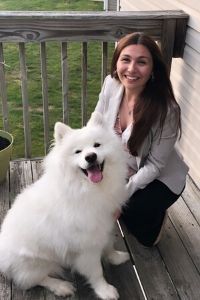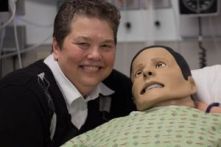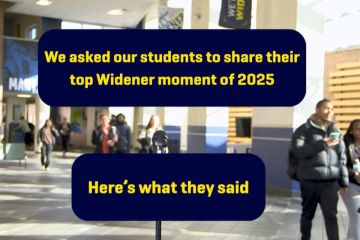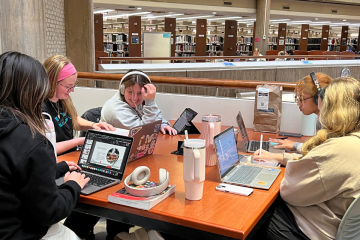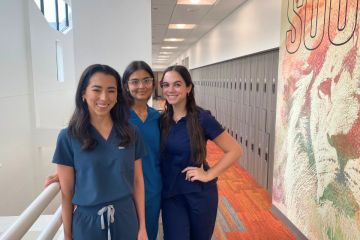A Spotlight on Graduate Research at Virtual Symposium

Graduate students are advancing their fields and gaining rewarding career experience through research at Widener. Their efforts shined at the 2020 Online Graduate Student Research Symposium.
Every year, the symposium features graduate student research projects from the School of Human Service Professions and School of Nursing; however, the in-person poster presentations and roundtable discussions were moved online this year in light of the COVID-19 pandemic.
Participants viewed the posters in advance through the Library Digital Collections, then met the student authors and asked questions via Zoom on May 12. Topics ranged from an evaluation of a prison program in which inmates train puppies to work as service dogs for wounded veterans, to a study of therapists’ experiences working with women of color with borderline personality disorder.
Maria Chiaffarano, like many students, used the symposium to investigate issues and topics that spoke to
her personal and professional interests. The clinical psychology student merged her love of animals and her work with incarcerated individuals to explore the impact of prison-dog training programs.
“I grew up on a farm and had all sorts of animals, so personally I have always experienced the benefits of having animals around,” said Chiaffarano, who graduated from the program in May.
There are currently 2.3 million people incarcerated in the United States. Mental illness among this population is nearly five times higher than in the outside community, underscoring the need for effective therapy, including working with animals.
“There’s very limited contact in a prison environment, so bringing animals in is one way that inmates can have contact,” Chiaffarano explained.
During the virtual symposium, Chiaffarano illustrated how the incorporation of dog training programs in facilities, specifically the non-profit America’s VetDogs, benefits inmates while simultaneously training dogs ahead of adoption.
I’ve had various practicum and internship placements throughout the past five years in jails and prisons and I’ve been able to see these programs and how much it means to the inmates to have that opportunity —Maria Chiaffarano '20
As a first-time symposium presenter, Chiaffarano was excited for the in-person poster session. Moving the symposium online didn’t deter from the opportunity to share her work and connect with other student researchers.
“It was really cool we each had the chance to talk and everybody was together online. And it was really great to hear about other people’s projects – I actually emailed other students to read more about their research.”
Joshua Ellow, a doctoral student in the social work program, agreed that the experience of presenting – even online – was worthwhile, especially across disciplines.
I found it really beneficial to hear other people’s perspectives and areas of interest. It was a way to hear about people’s passions —Joshua Ellow
In advance of his dissertation, Ellow has immersed himself in the literature and history of psychedelics and is researching how psychedelic-assisted therapies can support well-being, taking into account the entire person, both body and mind.
“One of the ways social workers conceptualize wellness is a biopsychosocial model, by understanding that health and wellbeing-related changes don’t happen just because of medicine,” Ellow said. “This is a more thorough way of thinking about treatment.”
Ellow hopes his research in this emerging field will encourage ongoing dialogue related to their use within social work and behavioral health fields.
“The social work field has the ability to look at the research and determine if the research is valid,” Ellow said.
Nursing science doctoral student Deborah Halliday presented her work on an innovative teaching strategy designed to practice meaningful end-of-life conversations for nursing students.
According to Halliday, having these conversations “is one of the hardest things to do in nursing” because it requires being “able to be empathetic and provide information that is useful for the families and the patient.”
She developed a palliative care simulation within an end-of-life course offered at Moravian College where Halliday works as an instructor and simulation lab coordinator. Working in partnership with colleagues Dr. Paulette Dorney and Jennifer Landis, Halliday introduced a simulation with actors, rather than manikins, to provide students with the experience of guiding competent and compassionate conversations with patients and their families.
A lot of nurses try to protect themselves so they put up a wall when dealing with end-of-life patient concerns. They practice their nursing skills, but don’t necessarily connect with that therapeutic part of the communication line that might be useful for patients and their families —Deb Halliday
Halliday’s teaching strategy comes at a crucial time as nurses battle against COVID-19 and experience a surge in end-of-life care. Though Halliday’s project started before the outbreak, its purpose is applicable for nurses today.
“If students have the opportunity to have difficult conversations with patient and family actors in the safe environment that simulation offers, it might be easier for them to discuss palliative care options when faced with patients nearing end-of-life” said Halliday.

